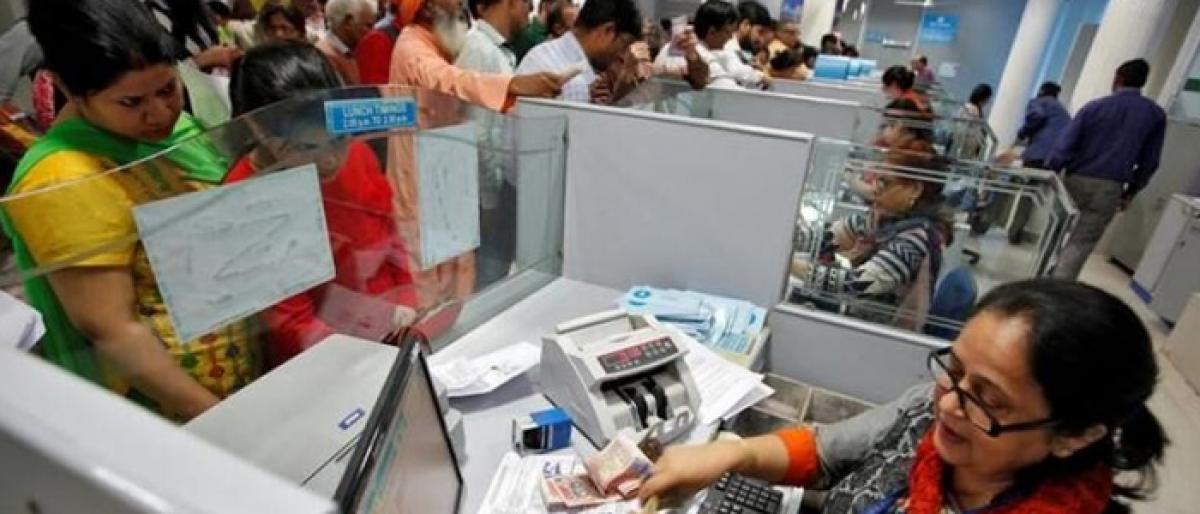Live
- UpStudy: The Smart Solution for Homework Hassles
- Actress Rithika and models inaugurate Sutraa Lifestyle Exhibition
- Loud campaign
- Faculty students celebrated english literature day in Government Degree College
- Huge fire accident.. Shops of street vendors burnt in the fire
- Pawan Kalyan promises to protect the coastal area from sea erosion
- EC Transfers Two Senior IPS Officers in AP ahead of Elections
- DMK analysis predicts victory for INDIA bloc in TN but concedes gains for BJP and NDA too
- India showcasing innovative technologies at World Energy Congress
- IPL 2024: Mitchell comes in for Ravindra as Lucknow opt to bowl first against Chennai
Just In

Recently Arvind Subramanyam, the Chief Economic Adviser to Government of India, was in Hyderabad to talk on universal basic income in a talk organised by Manthan, Hyderabad-based organisation. After the speech, during the question answer session the Punjab National Bank issue was raised and answering the question, the advisor felt that privatisation of the PSU banks could be a remedy to the proble
Recently Arvind Subramanyam, the Chief Economic Adviser to Government of India, was in Hyderabad to talk on universal basic income in a talk organised by Manthan, Hyderabad-based organisation. After the speech, during the question answer session the Punjab National Bank issue was raised and answering the question, the advisor felt that privatisation of the PSU banks could be a remedy to the problem.
Coming from the Chief Economic Advisor to the Government of India, his remarks need to be taken seriously and it does indicate a thinking at the highest level in the government that privatisation of PSU banks as an answer to the problems to the scams that are surfacing like the Vijaya Mallya case and Nirav Modi case.
There could be three different reasons for thinking in terms of privatisation of the PSU banks. NPA issues that have surfaced may represent tip of the iceberg and the problem itself could be so huge that recapitalisation of these banks may bleed the revenues of the state. There could be a genuine thinking that the private sector can do better and hence it would be better these financial institutions are handled by the private sector.
Or sensing an opportunity in the present-day problems that are being faced by the PSU banks, private capital – Indian as well as foreign – may be looking for attractive opportunities to capture these banks and hence might be lobbying for the same.
If the first one is the reason, one can understand the problems of the government, but if the other two are the reasons, then the government is committing a great blunder in going for privatisation of the PSU banks.
To understand the issue, one should have an idea of the evolution of the banking system in India. Before the nationalisation of 14 private banks by Mrs Gandhi in the year 1969, except State Bank of India and its associates all other banks were in the private sector and were mostly controlled by major business houses.
The growth of Indian banking in private sector was also not very healthy. Between 1947 to 55 almost all 350 banks failed in this country at the rate of 40 banks per year. In the absence of deposit insurance scheme, depositors lost everything that they put in these banks. Lending to the agriculture sector was minimum. Even as late as 1967, bank lending to agriculture sector was 2.2%. It is in this context the nationalisation of the fourteen private banks took place in 1969 followed by another bout of nationalisation of six more banks in the year 1980.
From then on, expansion of the branch network of the nationalised banks was phenomenal and by 2013 all of them had a branch network of one lakh branches employing about 12 lakh employees. In fact, generations of educated youth of India in 70s and 80s owe their employment opportunities to the phenomenal spread of the banking sector in the country. The seeds for the Pradhan Mantri Jan Dhan Yojana of comprehensive financial inclusion in fact were sown by nationalisation of banks in 1969 by Mrs Gandhi.
With the nationalisation of banks, political pressure for sanctioning loans for priority sector lending especially for weaker sections increased. Reluctance on the part of the bankers citing the unviable nature of the projects led to series of arguments between government agencies and bankers at different fora both at the state level bankers meeting and district level.
In those days, it was felt that these loan melas may result in nationalised banks becoming unviable and bankrupt. Janardan Poojary, the then Finance Minister, used to be really harsh with the banks for not sanctioning loans to the weaker sections. One of my relations who was doing audit of one of the public sector banks in 90s remarked that the nationalised banks were not going to lose due to individual decisions of the bankers at the branch level but were going to get into serious problems due to the irresponsible lending being done by their boards collectively. Today, in retrospect, one can see how prophetic his statement was.
Selection of the board of directors of the banks also left a lot to be desired. In 80s when I was Joint Collector of the district I was surprised to find that one of the MLAs who was a long-term Congressman on the board of the Corporation Bank. In 2010 I met a person in Lucknow airport VIP lounge who informed me that he was a party functionary of Congress and was on the board of a public sector bank. As could be seen by 2010 deterioration is complete. Unhealthy practices in the section of the top management of the banks and rumours of auction amounts for filling up of these posts were making rounds not without basis.
In spite of all these constraints, public sector banks have not done all that badly. The private sector banks have not come out as shining examples of efficiency and accountability. Global Trust Bank is a perfect example of this. The fact that the joint Parliamentary Committee allowed them to go scot-free without fixing responsibility shows how the private sector banks in a badly regulated environment can function irresponsibly without any accountability and go scot free. With such shining examples in private sector, it is beyond one’s comprehension how the Economic Advisor to the Government of India thinks privatisation is going to be a solution to the problems of the public sector banks.
The immediate task for the government is to recapitalise all these banks so that they can function well and go on with their normal activity of lending. In a country, where public funds are squandered away for megalomaniac projects of leaders both at the Centre and in the states, putting money to recapitalise these banks is a much better way of utilising the taxpayer’s money. Simultaneously, all those who are responsible for today’s sorry state of affairs should be brought to book and made accountable.
In fact, it’s a golden political opportunity for the present Prime Minister to prove his commitment to good governance and accountability. An appropriate action plan in this direction in the next one year properly implemented would in fact pay rich political dividends. It’s also time to take a serious look at the top management and strengthen them appropriately. Today, these PSU banks are in any case partly privatised public holding as low as 19% in United Bank of India and as high as 46% in Bank of Baroda.

© 2024 Hyderabad Media House Limited/The Hans India. All rights reserved. Powered by hocalwire.com







